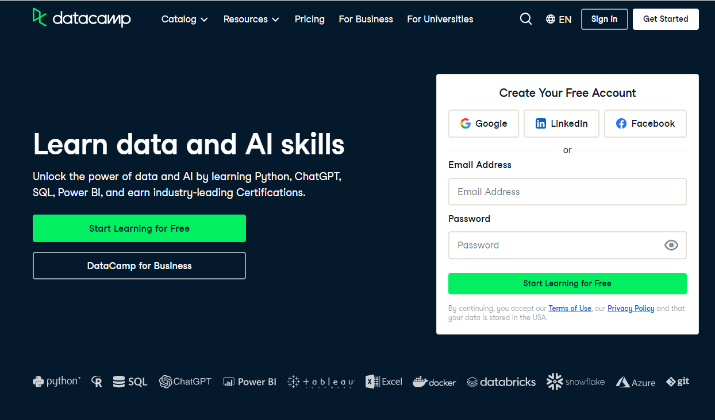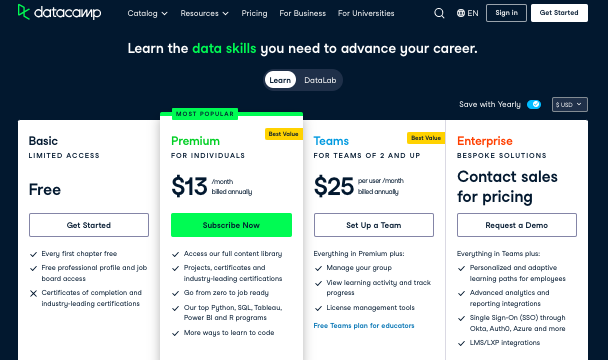DataCamp is a popular online learning platform that offers interactive courses and tracks in data science, analytics, and programming.
With a wide range of courses and tracks available, DataCamp has become a go-to destination for individuals looking to develop skills in these fields.
But are DataCamp courses good? In this article, we will discuss about these courses at length. We will find out their pros, cons, pricing and other things.
This will give you an idea of the course quality and whether they are good enough to invest in.
Introduction to DataCamp
DataCamp is a Massive Open Online Course (MOOC) platform that specializes in providing online courses primarily focused on data science and AI.
Established in 2013, DataCamp has become a prominent player in the online learning industry, known for its high-quality courses in data science.
With the increasing demand for data-savvy specialists, DataCamp caters to individuals and businesses seeking to enhance their skills in data science, programming, machine learning, probability and statistics, and data engineering.
One of the unique features of DataCamp is its focus on teaching popular programming languages and tools used in the data science field.
Python, R, SQL, Excel, Git, Tableau, Power BI, Shell, Scala, Spark, and Spreadsheets are just a few examples of the languages and tools covered in DataCamp courses.
DataCamp provides a simplified and easy-to-navigate platform, offering a learn-by-doing approach that allows learners to practice their skills in a practical and interactive manner.
The platform also offers a gamified in-browser coding experience, adding an element of fun and engagement to the learning process.
Also read: Best Free DataCamp Courses
Get Started with DataCamp for FREE.The place to learn R, Python & Data Science. Check Special Pricing.
Pros of DataCamp Courses
When it comes to DataCamp courses, there are several key advantages that make them a popular choice among learners.
1. User-Friendly Interface
DataCamp is known for its user-friendly interface that makes it easy for learners of all levels to navigate and engage with the platform.
This seamless experience ensures that you can start learning without any unnecessary hurdles.
The courses are structured with interactive video lectures, followed by hands-on coding exercises that allow users to practice what they’ve learned.
DataCamp’s workspace provides a simple and intuitive interface for writing code, analyzing data, and sharing insights.
The platform supports multiple data sources, including Excel, SQL databases, and Google Analytics, making it accessible for learners from various backgrounds.
Overall, DataCamp’s interface is designed to foster an engaging and effective learning experience for those looking to develop their data science and programming skills.
2. Quality Content
DataCamp is known for its high-quality content, which has significantly improved over time.
Initially, users reported that the content was not very practical and too text-based, with instructors often getting too involved in doing the work for learners.
However, DataCamp has since addressed these issues by making assignments more engaging, short, and practical.
DataCamp follows a learn-by-doing approach, allowing you to practice your skills in a hands-on manner. Each course is carefully curated to provide a comprehensive learning experience.
By working with real-world projects and exercises, you can truly reinforce your understanding and gain practical knowledge.
Get Started with DataCamp for FREE.The place to learn R, Python & Data Science. Check Special Pricing.
3. Extensive Range
DataCamp offers an extensive range of courses, skill tracks, and career tracks in data science and analytics.
With over 354 courses, 51 skill tracks, and 12 career tracks, learners can choose from a variety of topics and levels to suit their needs.
These courses cover essential skills such as Python, R, SQL, and data visualization, as well as advanced topics like machine learning and natural language processing.
DataCamp’s courses are designed to cater to both beginners and experienced learners, providing a comprehensive learning experience that can help individuals build a strong foundation in data science and analytics.
4. Interactive Learning
DataCamp’s interactive learning approach is designed to engage learners through hands-on exercises and gamification elements.
The platform offers a variety of interactive content, including video lectures, coding exercises, and quizzes, which allow users to practice and apply their new skills immediately.
Additionally, DataCamp incorporates gamification elements like badges and leaderboards to make learning more enjoyable and motivating.
You can engage with coding challenges and exercises in a gamified environment, which enhances your motivation and keeps you actively involved throughout your learning journey.
Learners earn badges and XP for completing exercises and achieving milestones, and they can track their progress on leaderboards.
This interactive and gamified approach helps learners stay motivated and engaged, fostering a sense of accomplishment and encouraging them to continue learning and improving their skills.
5. Inclusivity
DataCamp is committed to inclusivity, recognizing that learners come from diverse backgrounds and have varying levels of experience.
The platform caters to learners of all levels, from beginners looking to build a foundation in data science and analytics to advanced learners seeking to deepen their expertise.
DataCamp’s interactive learning approach, which includes hands-on exercises and real-time feedback, helps learners of all levels engage with the material and track their progress.
Additionally, the platform offers a wide range of courses and tracks, ensuring that learners can find content that aligns with their specific needs and goals.
By providing accessible and engaging learning experiences, DataCamp aims to empower everyone with the skills to succeed in data science and analytics, regardless of their starting point or level of expertise.
Check out: Is DataCamp Free For Students?
Cons of DataCamp Courses
While DataCamp courses have many strengths, it’s important to consider the limitations as well.
1. Limited Interaction
DataCamp courses are designed and created by a team, which means that there isn’t a specific instructor per course.
This can lead to limited interaction between learners and instructors, as learners do not have direct access to an instructor for guidance and support.
While DataCamp’s interactive learning approach includes hands-on exercises and real-time feedback, the lack of a specific instructor per course can leave learners wanting more guidance and support.
This limitation can be particularly challenging for learners who require personalized instruction or have specific questions about the material.
2. No Accredited Certificates
DataCamp does not offer a verified certificate from a partnered university or organization upon course completion. Instead, DataCamp provides a Statement of Accomplishment upon successful completion of courses and tracks.
These Statements of Accomplishment are solely proof of completing a DataCamp course or track and are not verified by an external institution.
While DataCamp offers professional certifications designed by industry experts, these certifications are not accredited or verified by universities or other organization.
However, it’s crucial to note that despite the absence of accredited certificates, DataCamp still offers high-quality learning experiences.
The focus is on enhancing your expertise and understanding of data analysis, programming, and machine learning.
If you are looking for learning programs that offer verified certificates in partnership with top universities and industry organizations, platforms like Coursera and edX may be better options.
Get Started with DataCamp for FREE.The place to learn R, Python & Data Science. Check Special Pricing.
3. Video Content Lacking Detail
DataCamp courses are known to have video content that is sometimes lacking in detail. The video tutorials are often short, which can leave learners feeling like they are missing something important.
This can be particularly challenging for learners who require more in-depth explanations or have specific questions about the material.
The brevity of the video tutorials can also make it difficult for learners to fully understand the concepts being presented, potentially leading to confusion or frustration.
4. No Additional Projects or Practice Problems
DataCamp courses do not typically include additional projects or practice problems beyond the exercises provided within the course.
While this approach allows learners to focus on specific skills and concepts, some learners have reported that the platform could benefit from adding more practice problems or assessments for skill building.
This is particularly true for learners who want to further reinforce their understanding of the material or need more opportunities to apply their skills in different contexts.
When evaluating whether DataCamp is the right choice for you, it’s essential to weigh the pros and cons based on your specific learning goals and preferences.
While accredited certificates may hold importance in certain contexts, the skills and knowledge gained from DataCamp courses can be valuable assets in their own right.
Explore: 8 Best Udacity Alternatives
Get Started with DataCamp for FREE.The place to learn R, Python & Data Science. Check Special Pricing.
Learning Experience with DataCamp
When considering DataCamp as an online learning platform, it’s essential to recognize its strengths and weaknesses.
DataCamp courses are particularly beneficial for learners who prefer a practical, hands-on approach and are looking to acquire core programming and data science skills efficiently.
The bite-sized learning plans, with sections ranging from 2 to 4 hours, make it easy to fit learning into your schedule.
However, if you are seeking specialized skills in areas such as object-oriented programming, use of integrated development environments (IDEs), statistics and math, or specialized packages like Pandas and NumPy, DataCamp’s curriculum may be limited.
In recent years, the direction of DataCamp’s curriculum has shifted more towards mainstream data analyst content like Tableau and Spreadsheets, moving away from the more advanced Python content demanded by advanced learners.
Therefore, to pursue a more comprehensive data science career path, it is advisable to consider the Data Engineer Track and develop statistics skills beyond what is covered on DataCamp.
The learning experience with DataCamp is subjective and may vary from person to person. While some individuals may find the platform’s approach highly effective, others may prefer a more comprehensive learning experience that explores additional topics beyond what DataCamp offers.
It’s important to assess your own learning goals and preferences to determine if DataCamp courses align with your needs.
Read this too: 7 Best Coursera Alternatives
Most Popular Courses on DataCamp
DataCamp offers a wide range of courses and tracks in data science and analytics, catering to learners of all levels. Here are six of the most popular courses on DataCamp:
1. Introduction to Python
Master the basics of data analysis with Python in just four hours. This online course introduces the Python interface and explores popular packages.
It covers essential skills such as data manipulation, visualization, and analysis, making it an excellent starting point for beginners.
2. Introduction to SQL
Learn the basics of relational databases and how to interact with them. This course covers essential SQL concepts, including data types, queries, and joins. It is designed to help learners build a strong foundation in data analysis and manipulation.
3. Introduction to ChatGPT
Discover best practices for writing prompts and explore common business use cases for the powerful AI tool.
This course provides an in-depth look at ChatGPT and its applications in various industries, making it an excellent choice for those interested in AI and machine learning.
4. Understanding Data Science
Dive into the exciting field of data science without coding.
This 2-hour introductory course covers essential concepts such as A/B testing, time series analysis, machine learning, and more. It is designed to provide learners with a comprehensive overview of data science and its applications.
5. Mastering Power BI
Learn to use the data visualization software to build impactful reports. This course covers the basics of Power BI, including data modeling, visualization, and reporting.
It is an excellent choice for those looking to enhance their data analysis and presentation skills.
6. Building Advanced Machine Learning Models
Learn to build advanced and effective machine learning models in Python using ensemble techniques such as bagging, boosting, and stacking.
This course covers advanced topics in machine learning, making it an excellent choice for those looking to deepen their understanding of the subject.
These courses are highly popular among DataCamp learners due to their engaging and interactive nature, which includes hands-on exercises and real-time feedback.
They are designed to cater to learners of all levels, from beginners to advanced learners, and provide a comprehensive learning experience in data science and analytics.
You might like this: How to Get 3 Months DataCamp With GitHub?
Get Started with DataCamp for FREE.The place to learn R, Python & Data Science. Check Special Pricing.
Pricing Options
When it comes to accessing DataCamp courses, you have a variety of pricing options to choose from.
DataCamp offers both monthly and yearly subscription plans that provide unlimited access to their extensive library of courses in popular programming languages like R, Python, SQL, and Shell.
When choosing the right pricing option for your needs, it’s essential to consider your learning goals and budget.
The subscription model allows you to access all the courses without any additional charges, making it a cost-effective choice for those looking to enhance their data science skills.
By subscribing to a DataCamp plan, you unlock a vast array of video lessons, coding challenges, and projects that are designed to provide a comprehensive learning experience and equip you with practical skills for real-life scenarios.
It’s worth noting that DataCamp occasionally runs discounts and promotions, making their courses even more affordable. So, keep an eye out for these special offers to make the most out of your learning journey.
An added advantage of DataCamp’s subscription model is that it gives you access to their 14 Career Tracks, which are expertly curated learning paths to assist you in selecting the most appropriate route for your education and career goals.
Also read: Best Dataquest Alternatives
Conclusion
Yes, DataCamp courses are good.
The courses provide a valuable learning experience for individuals interested in data science and AI. DataCamp’s user-friendly interface, quality content, and learning approach make it an attractive choice for learners of all levels.
Despite the lack of accredited certificates, the overall quality and affordability of DataCamp courses make them worth considering for your online learning journey.
Try DataCamp, today.













